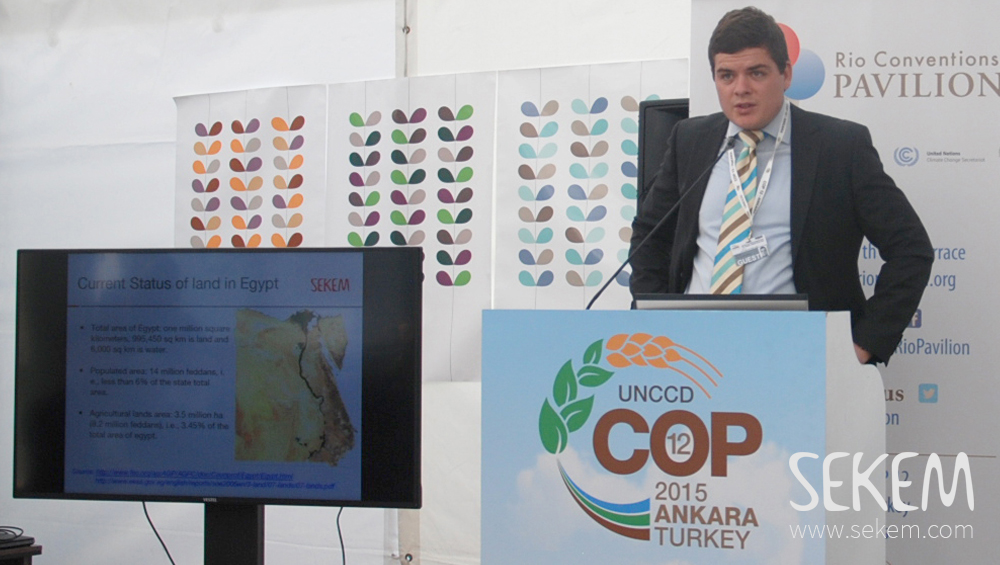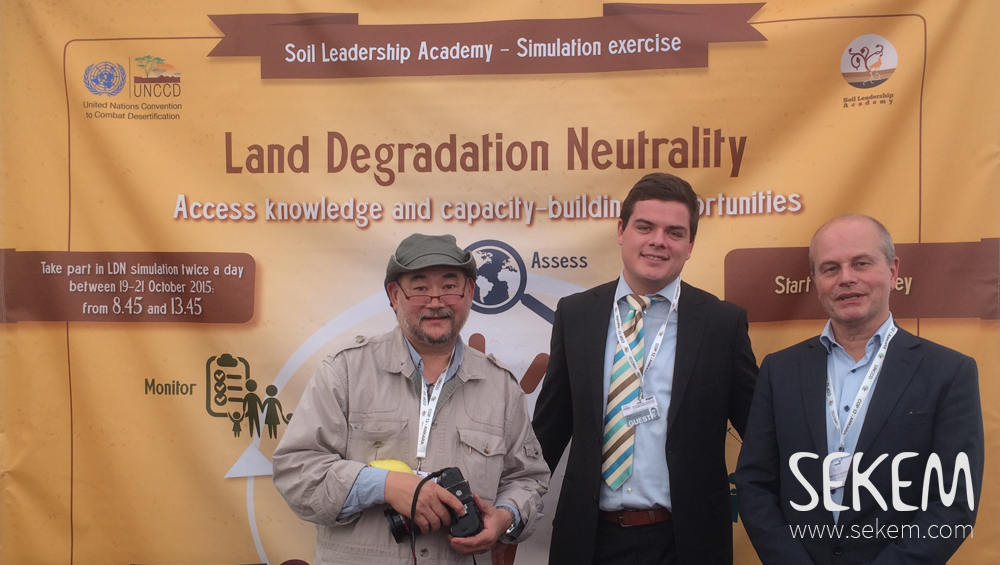Maximilian Abouleish-Boes, Chief Sustainable Development Officer at SEKEM recently represented SEKEM at COP 12 in Ankara, a high profile event regarding desertification. For SEKEM Insight he wrote about his experiences in Turkey with decision makers and experts from all over the world.
Six years ago, when I came to Egypt and got to know SEKEM, I realized that my generation has a huge responsibility; the responsibility to change and transform the way humans live on earth. In SEKEM, I found the right place for myself to contribute to this responsibility. During my time here in Egypt I was confronted with many different challenges and some of them still need to be overcome, but also a lot of exciting activities and success stories that are all contributing towards sustainable land reclamation and community building in the desert, which I see as crucial for a bright future in Egypt.
“Natural ecosystems are more valuable than anything that ever will be made, bought or sold!”
One of these success stories was receiving the Land for Life Award 2015 by the United Nations Convention to Combat Desertification (UNCCD) in July. Recently the UNCCD organized another great and very important event, this time in Ankara, the Twelfth Session of the Conference of Parties (COP 12), to discuss solutions related to desertification, land degradation and drought with many decision makers from all over the world. One key outcome in the preparations of this event was to formulate one of the recently launched Sustainable Development Goals (SDGs) that aims towards global land degradation neutrality (LDN) by 2030. An incredible amount of over 12 Million hectares of land per year need to be restored and managed sustainably to achieve that goal. Of course, this will have a positive effect on other SDGs, for instance in reducing greenhouse gas (GHG) emissions to mitigate climate change, secure food supply and reduce poverty especially among small-scale farmers. I had the opportunity to represent SEKEM at this high profile event. We were invited to showcase SEKEMs success in reclaiming desert land in a sustainable and inclusive way and to develop communities with our holistic approach.

One whole day of the event, that was held from the 12th to 21st of October 2015, was dedicated to the “Land for Life”-topic. High decision makers and specialist held speeches followed by open panel discussions. Erdoǧan Özevren, Turkey’s National UN Focal Point, for instance said that: “Turkey has a simple message to its people: Don’t let Turkey become desert”. Dr. Dennis Garrity, UNCCD Dryland Ambassador, drew attention to the idea that communities are an essential driver for sustainable land reclamation. He went further by saying that while humans have a rich system of ethics to govern how we deal with one another, our ethics concerning the land are still in a very primitive state. There won’t be a change concerning land until communities come together to make change themselves. These thoughts of Dennis Garrity lead also to my focus: The importance of people and their capacity building in order to nurture the state of awareness and consciousness that form the sense of urgency and the will to act.
SEKEM: A Community in Harmony with Nature
It is not only about the methods how we can create or restore vital living soil to ensure our living but more about how we do it in a sustainable and effective way. In this context we need to promote a holistic approach. People have to be aware about the meaning of land and soil. They have to be educated in different directions, also in those of how to improve working together. I used SEKEMs concept as an example for how sustainable community building can look like, which in essence means the integration of economic, cultural and societal life of a large community in harmony with nature. As SEKEM is promoting sustainable development successfully and in the different dimension since 1977, the underlying call from an organizational perspective is now to find ways to upscale SEKEMs outreach to society and to find a governance form for the long-term future. Concretely, the main question is how to empower employees to strive towards SEKEMs vision and mission and deal with existing challenges and opportunities while realizing their own highest potential.
“We humans don’t give our earth and ecological system the right value…”
The presentation of the famous film-maker and ecologist John D. Liu inspired me very much. He pointed out that there is nothing wrong with the planet earth and its natural ecosystems, but with human-made systems that destroy the natural ecosystems. He added that biological systems are more valuable than anything that has been, or ever will be extracted, made, bought or sold from it. The problem is that our financial and economic systems do not have internalized this basic value assumption and we humans don’t give our earth and ecological system the right value. That is why he became an ambassador for Commonland, an organization that is actively promoting restoration economies and businesses and finding long-term and affordable funds for it.
Social Innovation – Strive Together Towards the Same Goal
I think we cannot highlight enough that soil is the most important foundation of our lives and it mirrors the quality of relationships of people in society (2015 is the United Nations International Year of Soils). Creating awareness about the strong connection between human and natural system is based in SEKEMs mission, and hence, receiving the Land for Life Award helps us to promote our approach. What we hope to find via events like COP 12 are local and international partners that are ready to share the risk and opportunity of SEKEM and to engage in sustainable land reclamation and community development together with more than 400 small-scale farmers in Egypt. For me, it is a true social innovation when business partners, researchers, NGOs, students, teachers and the government strive towards the same goal.
I am happy and thankful for representing SEKEM at COP 12, because it is one further step to take over responsibilities of my generation and to transform the challenges of today into the solutions of tomorrow.
Maximilian Abouleish-Boes/Christine Arlt
SEKEM receives Land for Life Award 2015
SEKEM attends COP 12
Read about the Twelfth Session of the Conference of Parties
The United Nations Convention to Combat Desertification UNCCD
Sustainable Development Goals (SDGs)

